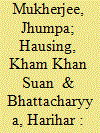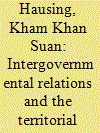| Srl | Item |
| 1 |
ID:
152462


|
|
|
|
|
| Summary/Abstract |
This article critically examines territorial strategies adopted by the Indian state to accommodate territorially concentrated minority groups in two very recent cases: the formation of Telangana (2014) and the Bodoland Territorial Council (BTC) (2003). We situate both cases within the broader context of linguistic state reorganization in India since the 1950s. We argue that while the formation of states on the basis of linguistic principle was necessary given the long history of demand for linguistic states in India, it is, as Telangana and BTC clearly bear out, not sufficient to accommodate minorities. This is especially the case when, inter alia, language is: (1) appropriated by the dominant group within a state (or states) as a vehicle to perpetuate political majoritarianism, (2) supplemented by weak power-sharing arrangement, and (3) occasioned by longstanding popular perceptions of historical injustices and relative deprivation.
|
|
|
|
|
|
|
|
|
|
|
|
|
|
|
|
| 2 |
ID:
193204


|
|
|
|
|
| Summary/Abstract |
This article examines how and to what extent ethnic diversity underpinned intergovernmental relations (IGR) in deeply divided societies like India. Central to this is the vertical and intermediating roles of political actors, structures and processes of Indian federalism in defining the ways in which ethnic diversity is territorially managed. Unlike Canada or Belgium which have more formal and robust structures of IGR, the inconsequential roles of formal structures of IGR in India unduly leverage centralizing actors, structures and processes in the territorial management of ethnic diversity. Given that these centralizing actors, structures and processes are contingent on political expediency, the dynamic ideas, interests and strategies of centralizing and regionalist actors are particularly salient in defining not only the contours and outcomes of IGRs but also the ways in which “unity in diversity” are negotiated and balanced within the overarching framework of “self-rule and shared rule.”
|
|
|
|
|
|
|
|
|
|
|
|
|
|
|
|